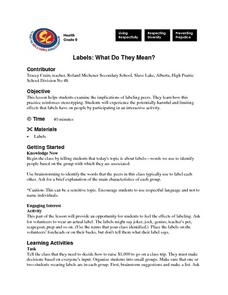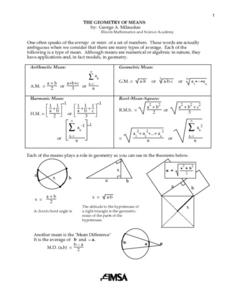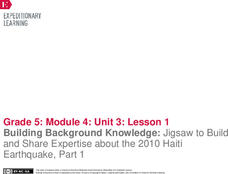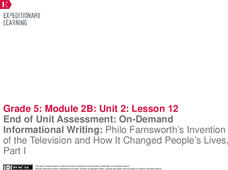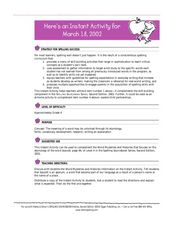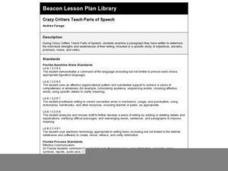Novelinks
Man's Search for Meaning: Problematic Situation
What are the three most important items for survival? Readers of Viktor Frankl's Man's Search for Meaning, ponder this question individually and share their list with a group, that must then reach consensus on the three most important...
EngageNY
Close Reading of The Boy Who Loved Words: How Do People Build Their Word Power?
Third graders practice the skills of identifying the main message in a story, describing the main character, and sorting the key details of a story into specific categories. The story they read is, The Boy Who Loved Words. Using a...
Curated OER
Labels: What Do They Mean?
Ninth graders brainstorm words they typically use to label each other, discuss effects of labeling, including reinforcement of stereotypes, and experience potentially harming and limiting effects that labels have by participating in...
Novelinks
Man's Search for Meaning: ReQuest Procedure Questioning Strategy
As part of a study of Viktor Frankl's Man's Search for Meaning, class members respond to, and craft, higher-level comprehension questions based on passages from the text.
Curated OER
Context Clues
Young scholars practice identifying the meanings of unknown words using context clues. In this vocabulary lesson, students read sentences which contain an unknown words. They will use the context of the sentence to determine the meaning.
Curated OER
Metaphor: Parts of the Body
In this metaphor--parts of the body worksheet, students participate in describing parts of the body by utilizing metaphor phrases for a stronger description of key terms.
Curated OER
Introduce Compound Words
First graders practice reading compound words. In this word identification lesson, 1st graders are introduced to several compound words and practice decoding the words by breaking them up into two parts. Students practice reading several...
Curated OER
Making Words
Third graders spell words and define homophone. In this making words lesson plan, 3rd graders decipher words from letter strips in an effort to identify the "secret word". Students use a set of letters to spell different words.
Curated OER
The Geometry of Means
For this geometry worksheet, students are given a rectangle and a square. They verify ratios when given equal perimeters or areas. Students are given adjacent squares. They find the distance between the centers, and identify the means...
Curated OER
Using a Dictionary
When do we use dictionaries? Provide this dictionary scavenger hunt for your youngsters. Third and fourth graders search for words, recording the number of syllables or definition for a variety of words. Get your class using dictionaries...
Curated OER
My Reading Words in My Social Studies Book?
Connect social studies and language arts using this resource. After studying root words, have learners locate five words from their social studies book that have a prefix, suffix, or root word. This puts a new twist on practicing basic...
Curated OER
Solving Math Problems In the Real World
Upper elementary and middles schoolers discuss and solve real world applications of math. They use formulas for volume and percents to answer real world questions. In the second part of the activity, groups write and solve word problems....
Curated OER
Worth a Thousand Words: Depression-Era Photographs
Students view images of New Deal programs to see its successes. They work in groups to create captions for the images and suggest captions that might indicate different meanings.
Read Write Think
Poetry Portfolios: Using Poetry to Teach Reading
Over the course of five periods, scholars create a poetry portfolio. They begin with a reading of the poem, Firefly. With a focus on vocabulary, learners reread the poem then look for sight words and other skills.
Curated OER
Phineas Gage: Notecard Vocabulary Strategy
Understanding the vocabulary in a text, especially a text like Phineas Gage: A Gruesome but True Story About Brain Science that includes quite a few technical terms, can be the key to understanding the text as a whole. Learners focus on...
EngageNY
Building Background Knowledge: Jigsaw to Build and Share Expertise about the 2010 Haiti Earthquake, Part 1
Using the Jigsaw protocol, scholars study chunks of text from a speech given by former US presidents following a devastating 2010 earthquake in Haiti. As they read the speech in small groups, they build background knowledge and share...
Curated OER
Advanced Synonyms and Antonyms- Multiple Choice Verbs 5
Improve word choice and vocabulary skills with a straightforward grammar worksheet. As young readers observe the highlighted words for 12 multiple-choice questions, they choose the best synonym or antonym for each.
EngageNY
Mid-Unit Assessment, Part 2: Analyzing an Excerpt from the Narrative
Writing is a craft. Scholars take a mid-unit assessment where they answer questions about the author's purpose and craft in Douglass's narrative. After completing the assessment, pupils look continue with their independent reading text.
EngageNY
Researching Miné Okubo: Gathering Textual Evidence
Scholars read two texts about Miné Okubo’s life. In Riverside’s Miné Okubo and Miné Okubo, readers gather information to write narrative essays describing how Okubo became visible again. The essay serves as part of a performance task.
EngageNY
End of Unit Assessment: On-Demand Informational Writing: Philo Farnsworth’s Invention of the Television and How It Changed People’s Lives, Part I
On-demand isn't just for TV anymore. Writers complete their end of the unit assessment with an on-demand writing task. They read the article Television and answer questions about the gist, vocabulary, and content. They then complete a...
Curated OER
Roots
Young scholars are introduced to Latin and Greek roots, prefixes, and suffixes. They are given a lesson on ten root words that students identify the correct meaning of the words. Young scholars design cards that are divided into four parts.
Curated OER
Unlocking Word Meanings
Fourth graders investigate eponyms in the English language. In this eponym lesson, 4th graders participate in a teacher led lesson on the definition of an eponym. They complete a worksheet in which they determine which eponym became part...
Curated OER
Analyzing Unknown Words
Learners analyze affixes and how they affect word meaning. In this language arts lesson, students use charts to construct and deconstruct words to find meaning.
Curated OER
Crazy Critters Teach Parts of Speech
Middle schoolers create pieces of writing about a creature they have created. They examine the parts of speech and how they are used in their writing to see how they can write more specifically.




